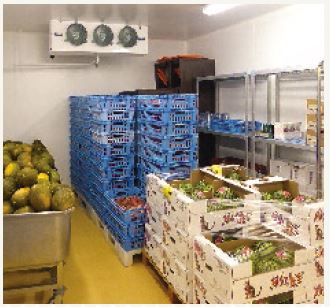Following the European Commission’s request for local authorities to implement the ISO 50001 standard as part of a trial, the catering kitchen in the Muretain district, arranged for an energy management audit to be conducted, only to find that the kitchen had the third highest gas and electricity consumption of all council run services. Faults were discovered with its cooling equipment, and particularly on one of its chilled units. « This initial audit under the ISO 50001 standard made us aware of the energy issues associated with our assets and it allowed us to take priority steps to rectify the situation in February 2018 » explained Water, Energy and Environment Officer Cédric Debevre.
Built in 2004 and covering an area of 1,400 m², the UCPA catering kitchen is located in the town of Eaunes, it has 28 employees and produces 9,000 meals a day. These are delivered to 56 canteens, mainly in nursery and primary schools, via 47 delivery sites from Monday to Friday, when four rounds are made from 6am each day. The meals are prepared and cooked daily and are delivered chilled, ready for reheating the next day, with the exception of those prepared on a Friday, which are delivered on the following Monday. The dietician plans the menus six months in advance together with the chef, to offer a suitably balanced diet for the children while making best use of the food available and keeping within budget.
 As Laurent Laclau, the central kitchen’s Production Manager, reminds us « Our aim is to make a long-term commitment to all of the measures we have chosen to take. We prefer to use short supply chains and buy from local producers. So our carrots, for instance, come from Saint Jory, which is only a few kilometres away. We are also investing in stainless steel food containers so that we don’t need to use as many polypropylene trays to deliver our meals, which will help us to limit the amount of waste produced. And lastly, the decision to renovate our refrigeration equipment is also a key environmental challenge for us, the aim being to reduce leaks and to acquire the right cooling capacity for our needs ».
As Laurent Laclau, the central kitchen’s Production Manager, reminds us « Our aim is to make a long-term commitment to all of the measures we have chosen to take. We prefer to use short supply chains and buy from local producers. So our carrots, for instance, come from Saint Jory, which is only a few kilometres away. We are also investing in stainless steel food containers so that we don’t need to use as many polypropylene trays to deliver our meals, which will help us to limit the amount of waste produced. And lastly, the decision to renovate our refrigeration equipment is also a key environmental challenge for us, the aim being to reduce leaks and to acquire the right cooling capacity for our needs ».
R-448A retrofit for the MT unit and installation of a new heat recovery system
All of the condensing units supplying the central kitchen needed to be better managed and monitored to optimise their energy performance. Veolia was the company to take on this new challenge in coordination with the local authority department. An in-depth analysis was first carried out so that an efficient, long-term solution could be implemented..
The MT unit supplying the preparation rooms, the cold rooms (used for storing meats, vegetables, dairy products, etc.), the storage room for meals ready for delivery, and the waste room, was completely redesigned.
The project started during the February holiday period. Sarah Zioini, in-house sales representative at Climalife, helped Veolia choose the right solution after a periodic oil diagnostic test (DPH) was performed on the existing installation and a thermodynamic model created. R-448A refrigerant was chosen to replace R-404A in the system once the installation had been overhauled, the evaporators replaced and a new heat recovery system fitted to produce hot water for the building. All of these tasks provided a basis for organising the work schedule. Refrigerated trucks with temperature monitoring systems were hired to preserve the food products kept in storage at the time, and the meals required for leisure centres were prepared by an auxiliary kitchen during the holiday period. The remodelling work was completed within 10 days and everything has been working for the better since the equipment returned to operation !
The solution
Cold production for the central kitchen : an energy performance expert to watch !
« Adopting the ISO 50001 standard was an important lever for us. Our improvement process has only just begun, and we’re now planning to work on the kitchen’s other two refrigeration plants supporting the central kitchen during the summer holidays to make them compliant too. All of this has enabled us to review our specifications with our service provider, Veolia, and to work together more closely to achieve better energy performance with the benefit of more comprehensive monthly reports and advice on any improvements that can be made. After four months of operation, we’ve already seen a significant difference in our electricity bill. But we’ll get a much clearer picture over the coming months, » Debevre concludes.

